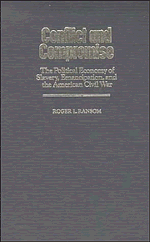3 - The Economics of Slavery
Published online by Cambridge University Press: 05 June 2012
Summary
We got up early, you betcha. You would be out there by time you could see and quit when it was dark. They tasked us. They would give us 200 or 300 pounds of cotton to bring in and you would git it, and if you didn't git it, you better, or you would git it tomorrow or your back would git it. Or you would git it from someone else, maybe steal it from their sacks.
Austin Grant, A slave in Mississippi and TexasThe first black laborers arrived in British North America in the fall of 1619. They were brought to Virginia – as were many whites – to work either as servants or as laborers in the field. Laborers, particularly those willing to toil in the hot Virginia sun, were in great demand at this point, as colonists scrambled to cash in on the discovery that tobacco leaves grown in Virginia had a ready market back home in England. Although Negro slavery was common in the Spanish part of the New World, there was no legal basis for slavery in the British colonies at this time. Consequently, these first arrivals from Africa were not regarded as slaves, but as indentured servants, and were granted rights similar to those of white indentured servants. The status of black indentured servants as free laborers was short-lived. As the number of blacks began to increase in the 163os and 1640s, the normal contracting arrangements for indentured labor were viewed as unsatisfactory.
- Type
- Chapter
- Information
- Conflict and CompromiseThe Political Economy of Slavery, Emancipation and the American Civil War, pp. 41 - 81Publisher: Cambridge University PressPrint publication year: 1989



